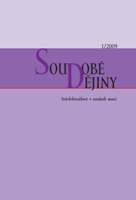Návrat André Gida
The Return of André Gide
Author(s): Daniela KolenovskáSubject(s): History
Published by: AV ČR - Akademie věd České republiky - Ústav pro soudobé dějiny
Summary/Abstract: The author begins by recalling the necessary conditions that enabled the spread of pro-Soviet sympathy amongst Western intellectuals in the 1930s. They include the dire consequences of the Great Depression, the growing Nazi threat, and the alluring ideals of social justice, in the light of which the Soviet Union appeared to many to be a radical, but attractive, social experiment. These attitudes from the end of the 1920s were supported by the organizational mechanisms and propaganda which Moscow employed to win support in Western intellectual circles. The author presents Andre Gide (1869–1951) as an engage writer who did not hesitate to express his morally non-conformist and socially critical views, although without joining an organization or abandoning his individualism. None the less he was unable to resist his Communist friends’ urgings to participate in various cultural-political events organized by the French Communist Party. Moscow began to take an interest in Gide in connection with his efforts to get justice for the Bulgarian and German Communists on trial in Leipzig for having allegedly set fire to the Reichstag in 1933. Like many other French writers, Gide had been persuaded to get involved by the writer Ilja Erenburg (1891–1967). In the summer of 1936 Gide accepted an invitation from the Soviet Writers’ Union to visit the U.S.S.R. The journey resulted in Gide’s famous volume of reporting, Retour de l’U.R.S.S. (1936). In this work, he also describes in moderate terms his negative impressions of the journey, which he intended as friendly criticism. For the Soviets, however, that was unacceptable, and in late 1936 they launched a campaign against his alleged slander. Shortly afterwards, the French Communists joined in against Gide. The article also considers the heated debates amongst Czechoslovak artists. The extreme, Stalinist positions from these debates are represented by Anti-Gide neboli Optimismus bez pověr a iluzi (Anti-Gide: Optimism without superstition or illusion) by the writer Stanislav Kostka Neumann (1875–1947), and the balanced, detached view, for example, of the literary historian and critic Vaclav Černy (1905–1987). In reply to the Communist attacks, Gide published Retouches a mon Retour de l’U.R.S.S. (1937), in which he condemned the Moscow show trials, thus bringing his pro-Soviet episode to a close.
Journal: Soudobé Dějiny
- Issue Year: XVI/2009
- Issue No: 01
- Page Range: 48-68
- Page Count: 21
- Language: Czech

